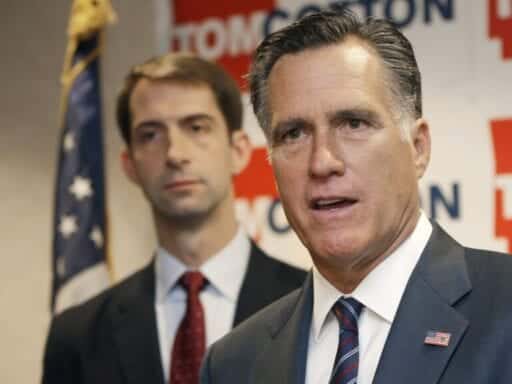Some GOP senators are rallying around the idea of cash, while Democrats are nowhere to be seen.
A few months ago, the idea of giving every American adult $1,000 cash was a relatively fringe idea in US politics, the pet proposal of long-shot presidential candidate Andrew Yang and almost no one else in elected office.
The coronavirus crisis and fears of a resulting recession have changed that situation basically overnight. While Americans received checks as part of the response to recessions in 2001 and 2008, those were sent out as rebates or refunds to taxpayers. Never before have all Americans, regardless of income, gotten checks. On Monday, Sen. Mitt Romney, the Utah Republican and former GOP presidential nominee, called for $1,000 cash payments to every American adult as coronavirus measures to keep people in their homes threaten to put millions out of work.
“While expansions of paid leave, unemployment insurance, and SNAP benefits are crucial, the check will help fill the gaps for Americans that may not quickly navigate different government options,” Romney argued in a press release.
This, to be clear, is not the same as Yang’s proposal. Yang wanted monthly checks as a regular government policy, while Romney is supporting a one-off $1,000 check as an emergency measure. In that context, $1,000 might not be enough: Former Obama chief economist Jason Furman has proposed payments of as much as $3,000 per adult and $1,500 per child.
But the fact that a conservative Republican is proposing unrestricted cash payments during a GOP administration — in which even heavily regulated government programs like food stamps are under attack — is notable. And Romney is not alone in this. Sen. Tom Cotton (R-AR), one of the most conservative members of the Senate GOP and a likely future presidential contender, went on Fox & Friends on Monday morning to call on Congress to dispense with complicated mechanisms like tax credits and instead put “cash in the hands of affected families”:
The House bill sets up a complicated relief system that relies on paid sick leave & refundable tax credits.
That won’t move quickly enough & puts undue pressure on businesses to lay off workers.
We don’t want to see layoffs—we need cash in the hands of affected families. pic.twitter.com/64hNtYhfJO
— Tom Cotton (@SenTomCotton) March 16, 2020
The exact parameters of Cotton’s proposal are as yet unknown; I’ve asked for clarification from his office and will update this story when I hear back.
Some Democrats not in leadership have also been pushing their own versions of this idea. There is already a cash bill in the House from Democratic Reps. Tim Ryan and Ro Khanna that would give at least $1,000 to every American making under $65,000, and as much as $6,000 to some families with children.
But the involvement of conservatives in this effort is a remarkable turnaround. Conservatives fought for decades to abolish America’s cash-assistance program for poor families with kids (and succeeded in 1996); Romney attacked Barack Obama over the issue during the 2012 election; and Cotton, who has been a consistent supporter of drug testing and work requirements for welfare programs, has even called for unemployed poor people without disabilities to be kicked off Medicaid.
Romney and Cotton are reflecting, to some degree, the consensus among economists, including many conservatives, that both economic stimulus and humanitarian considerations necessitate delivering cash to Americans immediately. It’s an especially compelling idea when compared to Donald Trump’s plan for payroll tax cuts, which would leave out any Americans who are out of work or not making hourly wages due to coronavirus shutdowns.
Harvard economist Greg Mankiw, who served as chief economist to President George W. Bush, has argued that cash payments are needed not so much to stimulate the economy as to help people whose jobs are impossible to perform due to social distancing. It’s a humanitarian measure, not a stimulus measure.
“Financial planners tell people to have six months of living expenses in an emergency fund. Sadly, many people do not,” Mankiw writes on his blog. “Considering the difficulty of identifying the truly needy and the problems inherent in trying to do so, sending every American a $1000 check asap would be a good start. A payroll tax cut makes little sense in this circumstance, because it does nothing for those who can’t work.”
Some sociologists and social welfare researchers have pushed back on the idea of giving cash to adults. Zach Parolin and David Harris at the Columbia Center on Poverty & Social Policy have called for cash allowances for families with children to combat the crisis, noting that one in three children living in poverty don’t get food stamps and that “the provision of cash to families with children would provide a more direct mechanism for enhancing the consumption power of all low-income families while providing the fungibility needed to meet the evolving conditions of this crisis.”
But Cotton, Romney, and Mankiw are all correct: We need cash now. And it’s extremely heartening that in a time of extreme partisan polarization, even conservative Republicans are putting aside their normal opposition to unrestricted cash welfare because they know it’s needed during this crisis.
Sign up for the Future Perfect newsletter and we’ll send you a roundup of ideas and solutions for tackling the world’s biggest challenges — and how to get better at doing good.
Future Perfect is funded in part by individual contributions, grants, and sponsorships. Learn more here.
Author: Dylan Matthews
Read More



